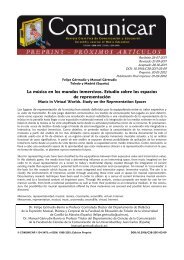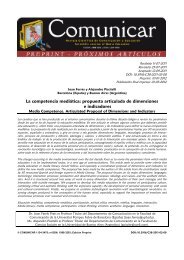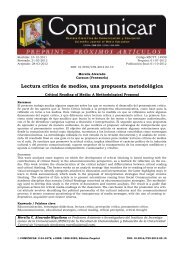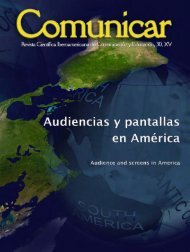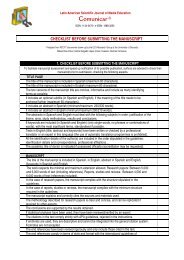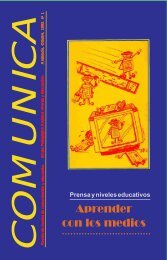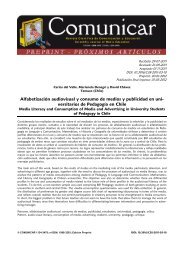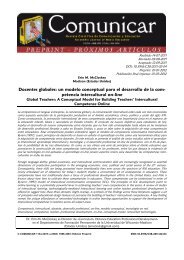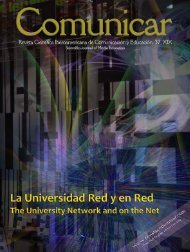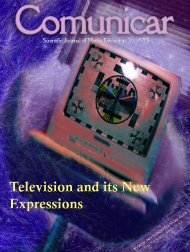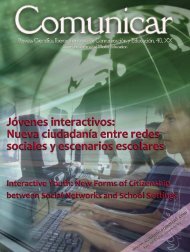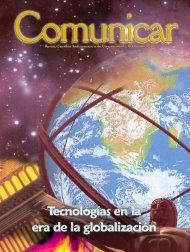Comunicar 39-ingles - Revista Comunicar
Comunicar 39-ingles - Revista Comunicar
Comunicar 39-ingles - Revista Comunicar
Create successful ePaper yourself
Turn your PDF publications into a flip-book with our unique Google optimized e-Paper software.
161in the Moodle platform that combined a learning activitythat fostered collaborative work with cooperationamong students and between students and teachers.One of the training focal points was the learning andsupport-mentoring model. The tutor was responsiblefor the entire training process and assessment of thestudent who in turn received input from specialist teachersand continuous and distance assessment rein -forced by self-assessment, co-assessment and interviewsvia videoconference.The assessment and qualification system proposedfor the course is a flexible model, adapted to the circumstancesof the course andthe students, where learningwas assessed throughout thetraining process itself andincluded online tasks whichwere evaluated from the perspectiveof individual and grouplearning. All this was embodiedin individual activities,collaborative activities, a finalmonograph project, interviewvia videoconference and inother issues such as active andquality participation.For the interview via videoconference as assessmentelement, we used Adobe Connect’sSynchronous Virtual Classroom whose functionsinclude, among others, online and live conferencesbetween users. The meeting room includes severalvisualisation panels (pods) and components, and alsoallows several users, or meeting attendees, to sharecomputer screens or files, chat, transfer live audio orvideo and participate in other interactive activities on -line.With this context and the pedagogical experiencestated, we aimed to carry out research to develop andcheck the viability of a formative assessment system forreliable online teaching with knowledge accreditationguaranteed, without the need for the physical pre -sence of the higher education student. At the sametime we aimed to:• Collaborate in the innovation and developmentof e-learning as an educational change agent, particularlyin line with the proposals for the EuropeanHigher Education Area.• Experiment with the suitability of the Moodleopen software platform for the students’ individual andcollaborative work and for the final interview via videoconferenceas part of the online assessment we aretesting.2. Materials and methodsThe study examines assessment in virtual learningsettings within a specialist university course for studentswho want to train as secondary education teachers.The distinguishing feature of the course for thestudents, together with the singularity of the proposedmethodology and assessment evaluation ), is the basisof the qualitative research proposal; as Rodríguez, Gil& García (1999) assert, it is about studying reality in itsnatural context to give meaning or interpret the phenomenaaccording to the meanings they have for thoseinvolved. This study aims to give special meaning toWe must use these technologies to innovate and not torepeat ineffective traditional models, misusing synchronousresources (such as videoconference) at the expense ofasynchronous resources (website, e-mail, discussionforums, etc.).the subjective aspects of the actors of the action, andis interested in the impressions and observations of theparticipants who can deduce the theories inductively.Following Rodríguez, Gil & García (1999), theresearch has been developed in four stages: a preliminarystage, fieldwork, an analytical stage and a informativestage. In this section we will describe the preliminarystage and the fieldwork with the results anddiscussion to follow.• Preliminary stage: This stage is developed out ofthe research’s conceptual theoretical framework. Thefield to be studied is defined in this stage, together withthe different stages of the qualitative research designand the description of the object to be studied, thetriangulation, the data collection tools and techniquesalong with the analysis to be developed.• Field work: This was the data collection, whichwas carried out at the beginning of the specialist courseand after it had finished.2.1. Participants• Teachers or tutors are essentially characterizedby their university and psycho-pedagogical training, sothey are particularly familiar with teaching/learningmodels. There were eight participants.• The students were graduates who had gained a<strong>Comunicar</strong>, <strong>39</strong>, XX, 2012© ISSN: 1134-3478 • e-ISSN: 1988-3293• Pages 159-167



